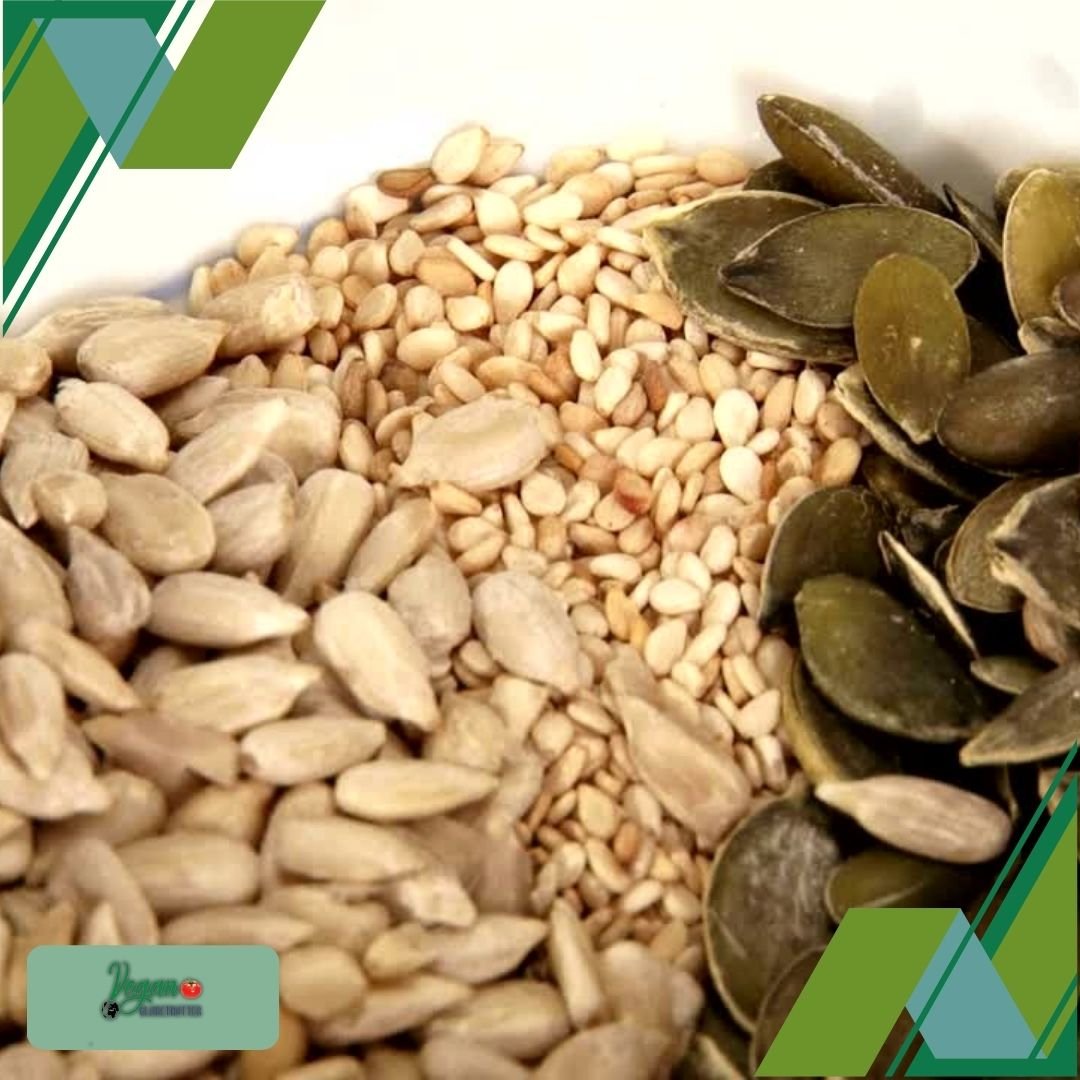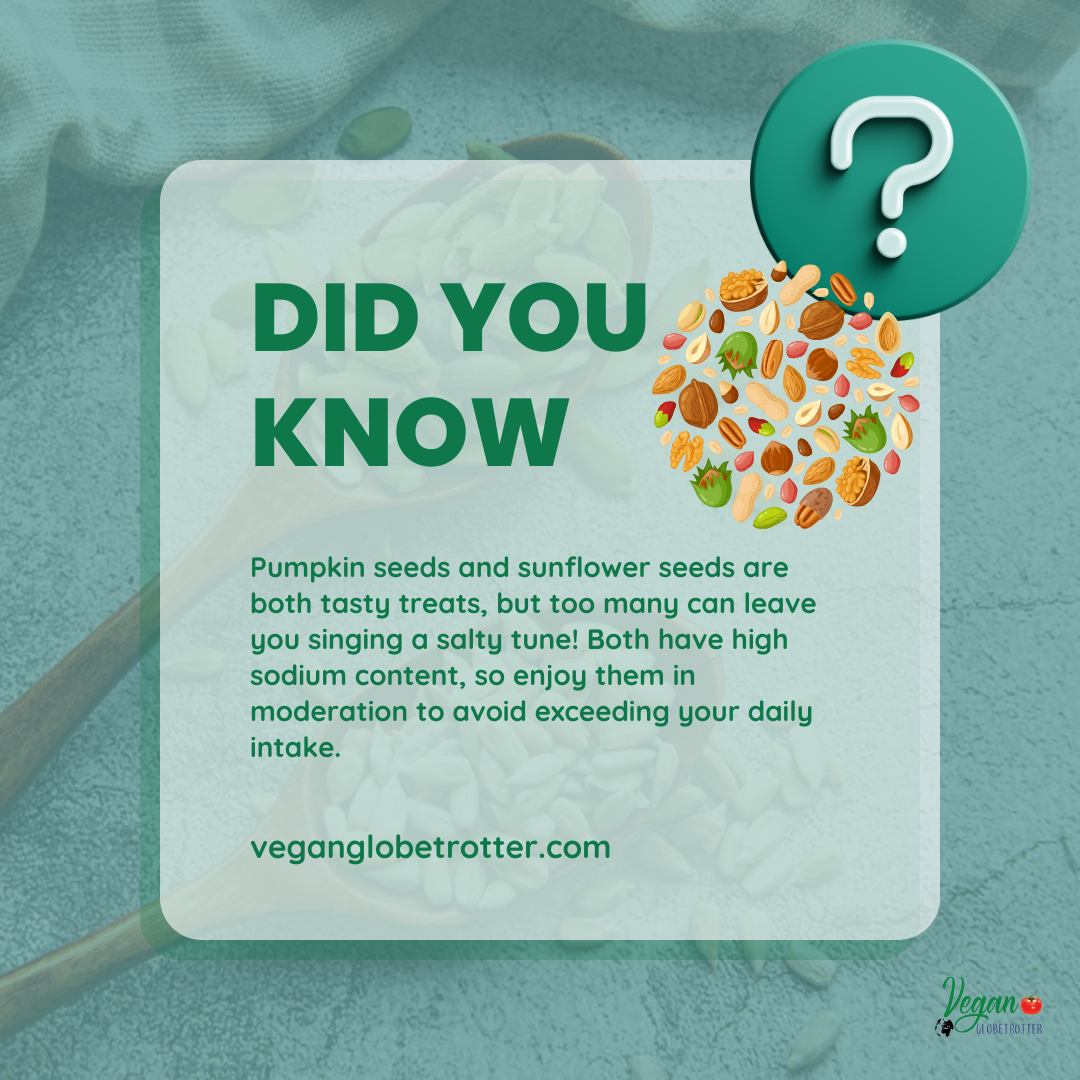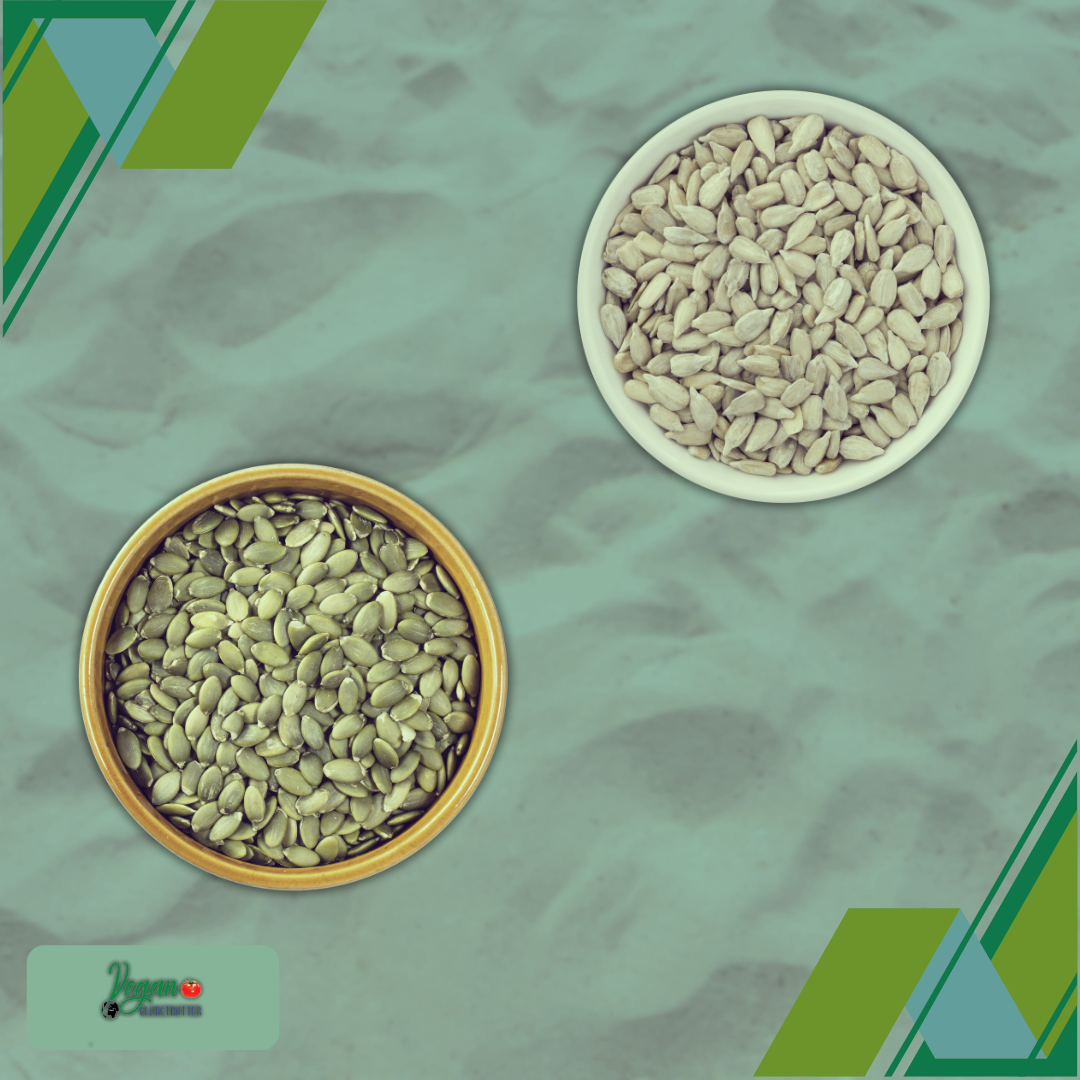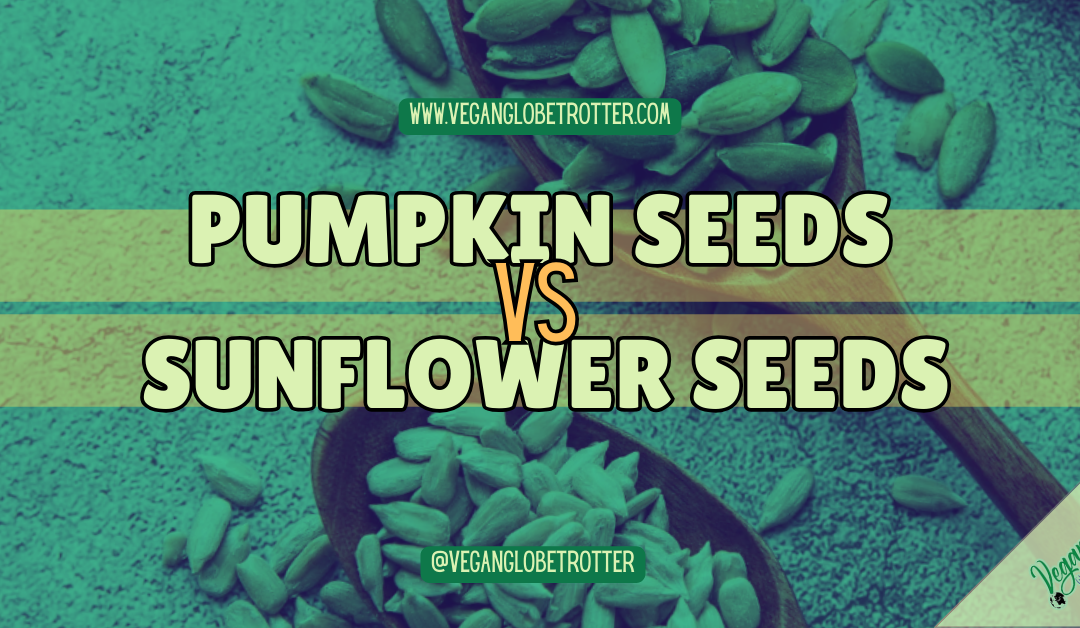Vegan Globetrotter is supported by our audience. When you purchase through one of our links, we may earn a small affiliate commission. As an Amazon Associate I earn from qualifying purchases. Your cost is not affected.
==================
Pumpkin Seeds vs Sunflower Seeds: In the world of healthy snacking, seeds are often overlooked, yet they pack a powerful punch when it comes to nutrition. Among the most popular are pumpkin and sunflower seeds, each boasting unique health benefits and culinary versatility. Whether you’re looking to boost your protein intake, add essential vitamins and minerals to your diet, or enjoy a tasty, crunchy snack, both seeds have much to offer. In this comparison, we’ll dive into the nutritional profiles, health benefits, and best uses of pumpkin and sunflower seeds, helping you decide which might be the best addition to your pantry. Want to find out more? Just keep reading!
Pumpkin Seeds vs Sunflower Seeds: Nutritional Benefits Compared
When choosing between pumpkin seeds and sunflower seeds for your diet, it’s essential to consider their unique nutritional benefits.
Pumpkin seeds are known for their higher protein and fiber content, making them an excellent choice for boosting these essential nutrients. They are also rich in magnesium, which supports muscle and nerve function, and zinc, which is crucial for immune health and wound healing. Additionally, pumpkin seeds contain healthy fats, including omega-3 and omega-6 fatty acids, which are beneficial for heart health.

On the other hand, sunflower seeds are a powerhouse of vitamin E, a potent antioxidant that protects cells from damage and supports skin health. They are also an excellent source of B vitamins, such as folate and niacin, which are vital for energy production and brain function. Sunflower seeds provide significant amounts of minerals like copper, which is essential for iron metabolism, and magnesium. While they are slightly higher in fat than pumpkin seeds, they offer a rich profile of healthy fats, particularly polyunsaturated and monounsaturated fats, which promote cardiovascular health.
Both pumpkin and sunflower seeds are valuable additions to a balanced diet. They each offer unique benefits and can be enjoyed in various ways, from snacking to adding to salads, smoothies, and baked goods. Understanding their distinct nutritional profiles can help you make an informed choice that best suits your dietary needs and health goals.

Key Takeaways
- Pumpkin seeds offer more protein and fiber.
- Sunflower seeds are rich in vitamin E and healthy fats.
- Both seeds have unique nutritional benefits.
Quick Comparison:
Use this table highlighting the nutritional differences between pumpkin seeds and sunflower seeds for a quick comparison:
| Nutrient | Pumpkin Seeds (per 1 oz) | Sunflower Seeds (per 1 oz) |
|---|---|---|
| Calories | 151 | 165 |
| Protein | 7g | 5.5g |
| Fat | 13g | 14g |
| Carbohydrates | 5g | 6.5g |
| Fiber | 1.7g | 3g |
| Vitamin E | 2% of DV | 37% of DV |
| Magnesium | 37% of DV | 9% of DV |
| Zinc | 14% of DV | 10% of DV |
| Iron | 23% of DV | 6% of DV |
Key Points:
- Sunflower seeds are higher in calories, fat, and fiber. They are also a richer source of vitamins, especially vitamin E and B-complex.
- Pumpkin seeds have more protein and are higher in magnesium and iron.
Both seeds are nutritious and can be a healthy addition to your diet. Some people have a personal taste preference, but adding both to your diet offers a great nutritional boost.

Nutritional Profiles
Pumpkin seeds and sunflower seeds each offer unique nutritional benefits. Here’s a detailed breakdown of their macronutrient, vitamin, and mineral content to help you understand the distinct advantages of each type of seed.
Macronutrient Comparison
Pumpkin seeds provide 53.8 grams of carbohydrates per 100 grams, higher than the 20 grams found in sunflower seeds. This makes pumpkin seeds richer in dietary fiber.
Both types of seeds are good sources of protein. Pumpkin and sunflower seeds both offer around 6 grams. They also contain healthy fats, including monounsaturated and polyunsaturated fats, that are beneficial for cardiovascular health.
Vitamin Content
Sunflower seeds are exceptionally high in Vitamin E, covering your daily requirement by 227% compared to pumpkin seeds. Vitamin E is essential for skin health and acts as an antioxidant, protecting your cells from damage.
Pumpkin seeds do have their vitamin benefits, including some B vitamins. These vitamins play a crucial role in energy production and brain function. However, sunflower seeds are generally more vitamin-rich, with a broader range of essential vitamins.
Mineral Content
Sunflower seeds contain significantly more selenium, offering 53 micrograms per 100 grams, compared to pumpkin seeds’ 0.3 micrograms. Selenium is essential for thyroid health and antioxidant defense.
Both seeds are sources of essential minerals such as magnesium and copper. Sunflower seeds are richer in magnesium, which is vital for muscle and nerve function. Pumpkin seeds provide more zinc, which is essential for immune health.
Health Benefits
Pumpkin and sunflower seeds offer various health benefits due to their rich nutritional profiles. They are particularly beneficial for heart health, provide essential antioxidants, and support strong bones.
Heart Health
Both pumpkin and sunflower seeds contain healthy fats, such as monounsaturated and polyunsaturated fats. These fats are good for the heart as they help lower bad cholesterol levels and increase good cholesterol.
Sunflower seeds are also rich in vitamin E, which can reduce inflammation, a significant risk factor for heart disease.
Pumpkin seeds are high in magnesium, which is crucial for maintaining a healthy heartbeat. In comparison, they also have a significant amount of fiber that aids in lowering cholesterol levels.
Antioxidant Effects
Sunflower seeds are exceptionally high in vitamin E, a powerful antioxidant. This vitamin helps protect cells from damage caused by free radicals. The seeds also contain selenium, which has been linked to lower oxidative stress.
Pumpkin seeds offer zinc, another essential antioxidant that helps to boost the immune system. Both types of seeds contain polyphenols, which help protect the body against various diseases related to oxidative stress.
Bone Health
Magnesium is an essential mineral for bone formation and maintenance. Pumpkin seeds are a good source of magnesium, which is vital for bone health. Magnesium deficiency can lead to osteoporosis and other bone disorders.
Sunflower seeds contain phosphorus, another important mineral that, along with magnesium, helps build strong bones. They also have copper, which is important for synthesising collagen and elastin, adding to the structural integrity of the bones. Regular consumption can contribute to stronger, healthier bones, significantly reducing the risk of fractures and bone diseases.
Uses in Diet
Pumpkin and sunflower seeds offer unique benefits and uses in our daily diets. They provide essential nutrients that support heart health and digestion while also being versatile in various culinary applications.
Dietary Considerations
Pumpkin seeds are an excellent source of magnesium and zinc, which are beneficial for bone health and immune function. They also have a high protein content that can help in muscle repair and growth. The dietary fiber in pumpkin seeds aids in digestion and helps maintain a healthy weight.
On the other hand, sunflower seeds are rich in vitamin E, which is essential for skin health and immune support. They also contain B vitamins and minerals like copper and magnesium. The fats in sunflower seeds are primarily polyunsaturated and monounsaturated, which are good for heart health.
Culinary Uses
Pumpkin seeds can be eaten raw, roasted, or as a crunchy addition to salads and soups. I often sprinkle them on oatmeal or incorporate them into homemade granola. Their mild flavor works well in both sweet and savory dishes.
Sunflower seeds are commonly used as a topping for salads, yoghurt, and cereal. I like to use them in baking and add them to bread, muffins, and cookies. Sunflower butter, made from ground sunflower seeds, is a tasty alternative to peanut butter and can be used in sandwiches or as a dip for fruits and vegetables.
Both seeds are easy to add to smoothies for an extra nutrient boost, enhancing the overall flavor and texture. Whether enjoying them as a snack or incorporating them into meals, these seeds are versatile and packed with nutritional benefits.
Potential Risks
While pumpkin and sunflower seeds offer many health benefits, they also have a few potential risks. These include allergic reactions and their high caloric content.

Allergic Reactions
Seed allergies, though less common than nut allergies, can be severe and should not be underestimated. Consuming pumpkin or sunflower seeds might trigger allergic reactions such as itching, swelling, hives, and even difficulty breathing. These reactions can vary in intensity and may pose significant health risks.
If you have a history of allergies or sensitivities, it’s essential to exercise caution and consult with a healthcare professional before incorporating these seeds into your diet. A doctor can provide personalized advice, recommend allergy testing, and ensure that adding pumpkin or sunflower seeds to your meals is safe for you. Prioritizing your health and safety is essential when exploring new dietary options.
Caloric Density
Pumpkin and sunflower seeds are nutrient-dense but also high in calories, with a small handful containing over 100 calories. This is particularly important to consider if you’re monitoring your weight.
For example, 100 grams of pumpkin seeds contains approximately 446 calories, and sunflower seeds have a similar caloric content. Consuming these seeds in moderation can help you avoid excessive calorie intake while still reaping their nutritional benefits.
Mindful portion control is key to enjoying the health advantages of pumpkin and sunflower seeds without adverse effects. Incorporate them wisely into your diet to balance their high caloric content with their valuable nutrients.
Environmental Impact
Understanding the environmental impact of pumpkin and sunflower seeds is crucial when comparing them. Each seed’s cultivation affects land use, water consumption, and overall sustainability.
Agricultural Footprint
The agricultural footprint of pumpkin seeds differs significantly from that of sunflower seeds. Pumpkin plants are typically cultivated using less intensive farming methods, which support soil health through diverse crop rotation systems. These plants are often grown alongside other crops, reducing soil erosion and promoting nutrient cycling, making pumpkin farming more sustainable.
In contrast, sunflower seeds require more extensive tracts of land due to their tall growth and need for considerable space. If not appropriately managed, high-density planting of sunflowers can lead to soil depletion over time. Additionally, sunflower farming often involves extensive use of fertilizers and pesticides, posing environmental challenges and potentially harming ecosystems.
By understanding these differences, consumers can make more informed choices about the environmental impact of the seeds they consume. Opting for pumpkin seeds can contribute to more sustainable agricultural practices while being mindful of the ecological footprint associated with sunflower seeds.
Seed Cultivation
Pumpkin seeds are derived from the fruit of the pumpkin, making them a valuable byproduct of a multi-purpose crop. Harvesting pumpkins for their flesh and seeds helps minimize waste and enhance the crop’s sustainability. This multi-use nature supports more efficient resource utilization and can contribute to more environmentally friendly farming practices.
In contrast, sunflowers are predominantly cultivated for their seeds, often leading to monoculture farming. Monoculture practices can threaten biodiversity and soil health due to the lack of crop rotation and diversity. Additionally, sunflowers require significant water, making their cultivation less water-efficient than pumpkin plants.
By understanding these agricultural differences, consumers can make more sustainable choices. Opting for pumpkin seeds supports a more eco-friendly and resource-efficient agricultural system while being aware of the environmental impact associated with sunflower seed production.
Pumpkin Seeds vs. Sunflower Seeds: A Nutritional Showdown
Choosing between pumpkin and sunflower seeds involves considering their nutritional benefits and environmental impacts. As a byproduct of a multi-purpose crop, pumpkin seeds offer higher protein and fiber content and are more sustainable due to diverse crop rotation and efficient resource use. On the other hand, sunflower seeds provide a rich source of vitamin E and healthy fats. Still, they are often grown in monoculture, requiring significant land and water resources and potentially impacting soil health.
When it comes to consumption, being mindful of portion sizes is crucial for managing calorie intake while enjoying the health benefits of both seeds. Additionally, if you have a history of allergies, consult a healthcare professional before adding these seeds to your diet.

Here’s a quick comparison:
| Seed Type | Carbs (per 100g) | Fiber (per 100g) | Fats (Total) | Key Vitamins | Key Minerals |
|---|---|---|---|---|---|
| Pumpkin Seeds | 53.8g | High | Moderate | Iron | Zinc, Magnesium |
| Sunflower Seeds | 20g | Moderate | Higher | Vitamin E, B Vitamins | Copper, Selenium, Magnesium |
However, always keep in mind that though both seeds are healthy and can be beneficial to your health, you still need to consider what is best for your needs and diet. Also, by understanding the distinct advantages and environmental considerations of pumpkin and sunflower seeds, you can make informed dietary choices that align with your health goals and sustainability values.
We hope this article has provided valuable insights to help you make informed choices about incorporating pumpkin and sunflower seeds into your diet. Enjoy exploring their unique flavors and nutritional benefits in your culinary adventures. Happy cooking!

Frequently Asked Questions
Pumpkin and sunflower seeds each offer a variety of nutritional benefits. Below, I address some commonly asked questions about their health impacts, protein content, potential for aiding in weight loss, anti-inflammatory properties, daily intake recommendations, and overall nutritional value.
What are the comparative health benefits of pumpkin seeds and sunflower seeds?
Pumpkin seeds are higher in dietary fiber, which helps with digestion. They also contain a good amount of zinc, which supports immune function. Sunflower seeds are rich in vitamin E and B vitamins, contributing to skin health and energy production.
How do pumpkin seeds and sunflower seeds differ in their protein content?
Pumpkin seeds typically have about 19 grams of protein per 100 grams. Sunflower seeds contain around 21 grams of protein per the same serving size. Both are good sources of plant-based protein but sunflower seeds have a slight edge in protein content.
Can consuming pumpkin seeds or sunflower seeds aid in weight loss, and if so, how?
Both pumpkin seeds and sunflower seeds can help with weight loss due to their high fiber and protein content. These nutrients promote feelings of fullness and reduce overall calorie intake. Including them as part of a balanced diet can support weight management efforts.
Are there anti-inflammatory advantages of including pumpkin and sunflower seeds in my diet?
Yes, both seeds contain anti-inflammatory compounds. They are rich in antioxidants, such as vitamin E in sunflower seeds and various phytonutrients in pumpkin seeds. These antioxidants help reduce inflammation in the body, supporting overall health.
What is the recommended daily intake of pumpkin and sunflower seeds for optimal nutrition?
I recommend consuming about 1-2 ounces (28-56 grams) of either seed per day. This amount provides a good balance of nutrients without excessive calorie intake. Always consider your overall diet and health needs when determining the right portion size.
In terms of nutritional value, which is considered healthier: pumpkin seeds or sunflower seeds?
The answer depends on specific nutritional needs. Sunflower seeds are higher in vitamin E and selenium, while pumpkin seeds offer more magnesium and zinc. Both seeds are nutritious and can be part of a healthy diet, but selecting one over the other depends on individual health goals.



Don't miss out
when new recipes and information are added!
Join our newsletter for free recipes,
healthy living inspiration, and special offers
You have Successfully Subscribed!